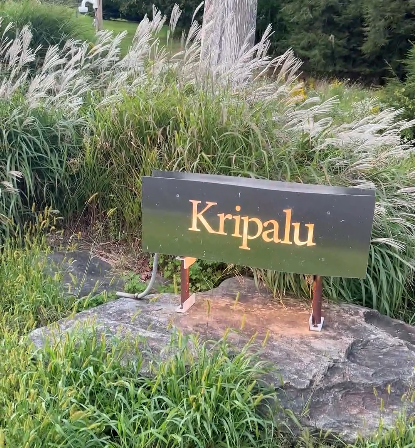Camp Menopause: An Integrative Approach
Thanks to Susan Dominus of the New York Times and other courageous women like Oprah, Drew Barrymore, Maria Shriver and various content creators bringing the conversation about menopause front and center, we’re seeing an uptick of information and awareness. Dominus showed us the current state of affairs in her viral article, Women Have Been Misled about Menopause, a snapshot of cultural perceptions and the dire need for more medical training and quality research.
I also appreciated what she shared about her personal experience entering into perimenopause, calling it “the biologically chaotic phase leading up to a woman’s last period, when her reproductive cycle makes its final, faltering runs.”
For me it happened during a year that I was feeling pretty great about myself. More confident than ever, spiritually centered, strong community. I was dating, traveling and generally living my best life.
It started with night sweats. Followed by heavy and erratic periods, more frequent UTIs, hair loss. Everything went haywire. Then came the mental fog, and the worst part, depression. I couldn’t believe I was here again, after all the work I’d done on myself over the years.
Fear Response to Chaos
Through it all, I watched myself reverting to a very familiar mode—jumping into high gear to get this chaos under control and back to a peaceful state. I’m a 9 wing 1 on the enneagram. It takes a minute for me to see what’s really going on inside.
I was binging podcasts and taking in lots of content, homing in on tactics and strategies—reducing sugar and white flour, eating a whole foods diet heavy in superfoods, rosemary oil for hair loss, strength workouts, supplements, meditation for stress relief and internal regulation, hormone therapy.
All good things. But for me, it became an obsession. Eating healthy turned to disordered eating; supplementing became a religion. I was getting mentally and emotionally dependent on the solutions I uncovered in a desperate fight to stop what was happening. I was resisting. Hard.
Thankfully, I have wise voices in my life that I can turn to when I go batshit. They remind me that this mad run for control won’t last forever, and the best thing I can do is to stay present with myself, being kind and curious.
So I did what I often do in times of inner tumult, I went to the beach. (You can substitute your preferred natural setting—just somewhere you can be alone for an hour.)
Photo by Jeremy Bishop on Unsplash
I sat facing the cresting waves, burrowed my feet into the cool sand. I took deep slow breaths. And then started talking. It’s an unhurried free flowing conversation where I speak all the parts. Hearing from my dad, a higher version of myself, God, and the voices in me that need to be heard.
I asked for help. I didn’t want my entrance into menopause to be anything like puberty—marked by ignorance, shame, neglect, embarrassment and silent confusion. I was ready to be shown a different way.
It doesn’t take long for an authentic call for help to get a response. The next day, I saw an article called, Latest in Wellness: The Menopause Retreat, listing various new programs being offered around the country. I’ve learned to respond to help offered, so a few weeks after that, I was off to what I was calling “Camp Menopause” at Kripalu Center for Yoga and Health in the Berkshires of Massachussettes. The real name of the program was, Unearthing the Wisdom of Menopause: Rituals for Self-Care and Discovery. But that was a mouthful when my family and friends would ask, “Uh, where are you going again?” Camp Menopause got us there faster.
Reframing Menopause: The Opportunity
Fast forward and I’m sitting in a large yoga hall called Sunrise Room, in a circle with a few dozen women from across the country, with ages ranging several decades. This tracks with the wide span of years covering the menopause transition (30s to 60s).
All of us had our unique experiences, but we were connected through a common purpose: searching for a way of being.
The first lesson came to us when instructors Erin Casperson and Edi Pasalis invited us to reframe our experience: “Menopause is a unique, whole-being developmental journey towards authenticity and fulfillment,” they said.
And right away I felt myself relax. Releasing the tight protective posture I’d taken starting from my first night sweat. This is what I came to hear.
They shared wisdom from various teachers: “You’re not suffering from a health disorder … Menopause is not pathological. You’re suffering from a lack of respect for the spiritual process you’re undergoing.” (Pope & Wurlitzer in Wise Power)
And: “Focus on what’s being born, not the labor.” (Therese Jornlin) In other words, focus on what we’re birthing during this fully embodied transformational time, and not just the symptoms.
I made the decision that everything I do from now on for my changing body would be from a place of enabling myself to take full advantage of my life stage and become a version of myself that is only now uniquely available for me.
Like Michelle Obama said about “becoming”—it’s a “forward motion, a means of evolving, a way to reach continuously toward a better self.”
Reframing Perimenopause: Riding the Waves
Shit comes at us hard during the upheaval of perimenopause. It can take us to our knees. What we do from there is up to us. We can let the roiling waves of hormonal change pummel us. We can dive underneath, ignoring and avoiding what’s happening. Or we can practice the habits that will let us ride the waves. (Thank you to Edi and Erin for this analogy.)
Riding the wave means readjusting our footing and balancing ourselves through new habits. Shedding unhelpful programming and rewriting our values based on who we are today. Peri-menopause is a staging ground—an intense time to face full-on what still needs to be faced and to do the work we need to do to live fully in these years.
Here are three guiding principles from Camp Menopause:
1 - Know What to Expect: We educate ourselves so that if/when we experience symptoms, we respond with, “Ok that was expected, I know what to do to address this so that I can live how I want to live.” Every woman’s menopause experience is unique and nuanced. Seek out the sources of information, professionals and communities that align to you. For me, I wanted an integrative perspective—emotional, spiritual as well as physical. So I’m seeking out information from this lens, going to Camp Menopause at Kripalu, searching for a functional medicine doctor, listening to voices that frame menopause holistically as a metamorphosis rather than a decline.
2 - Reset Your Values: We had ideas and beliefs incepted into us during our younger years that shape how we show up in life today. Now more than ever is the time to look inward and confront those ideas, asking, “Do I want to take this with me into this next stage of life?” Here are just a few ideas I’m leaving behind:
Belief: Money and outward beauty are essential for a secure, good life. Evolutionarily, I guess this might have helped while I was building my career and seeking a partner to raise a family with. I’m financially secure now and past the age of having children.
Belief: You never know when shit will go down and you’ll get hurt, so be on guard at all times. Served me during a time when my family life was unsafe, but I’m not a child in danger anymore. I can retire this part of myself, with love.
Belief: Avoid chaos, complications and hardship; seek what’s easy, safe and comfortable. Appropriate for a time when life had left me battered and I needed to rebuild. But I’m strong now— agile, confident and resourceful, so bring on the beautiful complexities of life!
What beliefs are you ready to let go of?
3 - Build Good Habits for Riding the Waves: One summer in my early 20s, a good friend and I tried to learn how to surf. With no regularity or understanding of technique, we simply grabbed our surf boards and headed into the Pacific. Needless to say, we got crushed. Getting punished over and over and making no improvement, we gave up. Thankfully I understand now that any big accomplishment starts with small habits and practices incorporated with regularity over time. Making “marginal gains,” as we call it over at Zscaler (my amazing day job).
Ayurveda: Habits for Creating a New Rhythm
Our instructors talked to us about Ayurvedic practices for creating a new rhythm in life. More than 5,000 years old, this system of medicine uses guiding principles around food, sleep, rest, and activity to have a grounded balanced life in any season. I was already a believer in the power of lifestyle changes as medicine, so this was tracking.
Ayurveda is a way to be situated in myself and situated in life at every stage, they explained. For a person who spent most of my life feeling like I didn’t fit in, this appealed to me.
Ayurveda teaches adaptation to new routines and habits to generate stability during the waves of change—habits around regular sleep times, meal times, meditation, exercise, massage, use of oils, and creating new cycles and ceremony to ground us in a new rhythm.
There’s so much more to talk about, and we will. But for now, I’ll leave you with this reflection and call to action from Camp Menopause :
Sit quietly, breathing slowly and deeply, grounding yourself in your body, and ask yourself: What can you do to understand and respect your menopause journey? What new habits will serve you in this life stage?
Resources mentioned:
Erin Casperson, Ayurvedic Health Counselor
Edi Pasalis, Director of the Kripalu Institute for Extraordinary Living
Kripalu Center for Yoga & Health, for Ayurveda education
Wild Power, Alexandra Pope, Sjanie Hugo Wurlitzer
“Reclaiming the Wisdom of Female Biology,” Therese Jornlin, Holistic health teacher
Becoming, Michelle Obama

